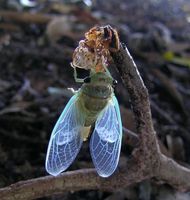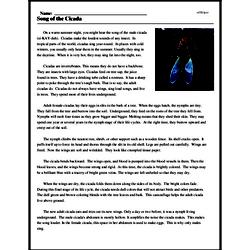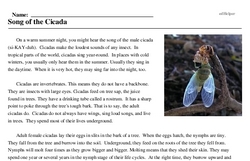Song of the Cicada
On a warm summer night, you might hear the song of the male cicada (si-KAY-duh). Cicadas make the loudest sounds of any insect. In tropical parts of the world, cicadas sing year-round. In places with cold winters, you usually only hear them in the summer. Usually they sing in the daytime. When it is very hot, they may sing far into the night, too.
Cicadas are invertebrates. This means they do not have a backbone. They are insects with large eyes. Cicadas feed on tree sap, the juice found in trees. They have a drinking tube called a rostrum. It has a sharp point to poke through the tree's tough bark. That is to say, the adult cicadas do. Cicadas do not always have wings, sing loud songs, and live in trees. They spend most of their lives underground.
Adult female cicadas lay their eggs in slits in the bark of a tree. When the eggs hatch, the nymphs are tiny. They fall from the tree and burrow into the soil. Underground, they feed on the roots of the tree they fell from. Nymphs will molt four times as they grow bigger and bigger. Molting means that they shed their skin. They may spend one year or several years in the nymph stage of their life cycles. At the right time, they burrow upward and creep out of the soil.




